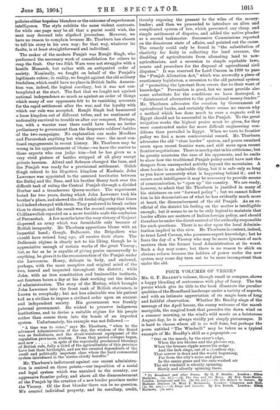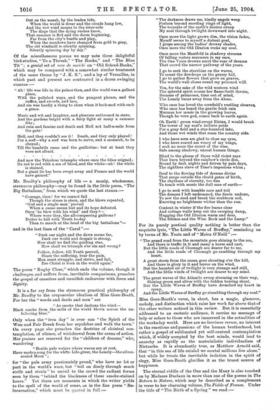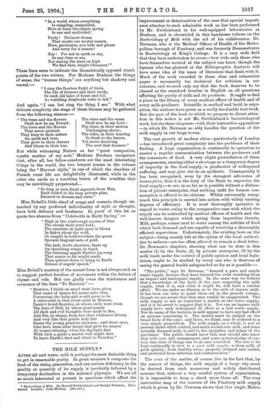poems which give its title to the book illustrate the
peculiar qualities of the Broadland landscape under a variety of aspects, and with an intimate appreciation of its magic born of long
and faithful observation. Whether Mr. Brad by sings of the message of the April breeze, the sunny welcome of the marsh marigolds, the magical hush that precedes the dawn wind on
a, summer morning, or the wind's wild music on a boisterous
August day, he is always vividly yet simply picturesque. It is hard to choose where all is so well done, but perhaps the poem entitled "The Windmill" may be taken as a typical example of Mr. Bradby's skill as a paysagiste "Out on the marsh, by the river's edge, When the iris blooms and the plovers cry, When the breezes ripple across the sedge And the lark sings, out of a cloudless sky,
That sorrow is dead and the world beginning, Far from the city's noise and glare, In the sunny grass and the rain-washed air The old windmill is silently spinning, Slowly and silently spinning there.
• (1) Broadland and other Poems. By G. F. Bradby. London : ElOchs Mathews. [2s. 6(1]—(2) The One and the Many. By Eva Gore-Booth. London Longmans and Co. [2e. 8d. net.]—(8) The Return to Nature.E2 Madame Lucian: (A- Mary F. Robinson). London: Chapman and (1s. Bd. net.)—(4) Songs and Sonnets. By Eva Dobell. London : Mathews. [Is. net.]
The dirge that the dying rushes know, That summer is fled and the doom beginning, Far from the city's bustle and play.
When the meadows have changed from gold to gray, The old windmill is silently spinning,
Silently spinning day by day."
Of the miscellaneous poems we may note three delightful bird-studies, "To a Thrush," "The Rooks," and "The Blue Tit "; a genial set of vers de soeiete on "Old School-Books," which may be compared with a somewhat similar treatment of the same theme by "J. K. S."; and a lay of Versailles, in which past and present are contrasted in a dozen swinging stanzas :—
" Ah ! life was life in the palace then, and the world was a gallant place, With the polished ways, and the pungent phrase, and the ruffles, and swords, and lace, And sin was hardly a thing to shun when it beckoned with such a grace.
Music and wit and laughter, and pleasure enthroned in state, And the gardens bright with a fairy light at many a summer fête ; And ruin and famine and death and Hell not half-a-mile from the gate!
Hell, and they couldn't see it ! Death, and they only played ! For a serf—why a serf was born to serve, and a monarch, to be obeyed; Till the tumbrils came and the guillotine : but at least they were not afraid.
And now the Tricolour triumphs where once the lilies reigned; Its red is red with a sea of blood, and the white—ah ! the white is stained, But a giant lie has been swept away and France and the world have gained."
Mr. Bradby's philosophy of life — a manly, wholesome, strenuous philosophy—may be found in the little poem, "The Big Battalions," from which we quote the last stanza :— " Courage, then ! for we cannot fail Though the stress is stern, and the blows repeated, God and a single man' prevail When a cause seems lost and its hope defeated.
Once he blew with his wind' and they ?— Where were they, the all-conquering galleons ?
Better to fall with Truth to-day
Than to march at the head of the big battalions "—
and in the last lines of the " Carol":—
" Dark our night and the dawn seems far, Dark our world and despair is strong, How shall we find the guiding star,
How shall we triumph o'er sin and wrong?
Follow, follow, till Truth prevail, Share the suffering, bear the pain, Man must struggle, and strive, and fail, Ere Christ is born in the world again."
The poem" Rugby Close," which ends the volume, though it challenges, and suffers from, inevitable comparisons, preaches the gospel of ceaseless and unselfish endeavour with force and
dignity.
It is a far cry from the strenuous practical philosophy of Mr. Bradby to the crepuscular idealism of Miss Gore-Booth, For her the "words and deeds and men" are
"As smoke that darkens the wind—
Black smoke from the mills of the world blown across the un- faltering blue."
Only when the "iron day" is over can "the Spirit of the Wise and Fair Break from her sepulchre and walk the town." On every page she preaches the doctrine of cloistral con- templation, of silence, of withdrawal from the arena of action. Her praises are reserved for the "children of dreams," who, wandering "Beside pale waters where waves are at rest,
Have made a song for the white Life-giver, the Lonely—the silver- souled Moon";
for " the pale army passionately proud," who have no lot or part in the world's wars, but "toil on dimly through much strife and strain" to unveil to the crowd the radiant forms seen by them "behind the blackness of these smoke-stained hours." Yet there are moments in which the writer yields to the spell of the world of sense, as in the fine poem "Be- incarnation," which must be quoted in full :— Once more the light grows dim, the vision fades,. Myself seems to myself a distant goal, I grope among the bodies' drowsy shades, Once more the Old Illusion rocks my soul.
Once more the Manifold in shadowy streams Of falling waters murmurs in my ears, The One Voice drowns amid the roar of dreams That crowd the narrow pathway of the years.
I go to seek the starshine on the waves, To count the dewdrops on the grassy hill, I go to gather flowers that grow on graves, The world's wall closes round my prisoned Yea, for the sake of the wild western wind The sphered spirit scorns her flame-built throne, Because of primroses, time out of mind, The Lonely turns away from the Alone.
Who once has loved the cornfield's rustling sheaves, Who once has heard the gentle Irish rain Murmur low music in the growing leaves, Though he were god, comes back to earth again.
Oh Earth! green wind-swept Eirinn, I would break The tower of my soul's initiate pride For a gray field and a star-haunted lake, And those wet winds that roam the country side.
I who have seen am glad to close my eyes, I who have soared am weary of my wings, I seek no more the secret of the wise, Safe among shadowy, unreal human things.
Blind to the gleam of those wild violet rays That burn beyond the rainbow's circle dim, Bound by dark nights and driven by pale days, The sightless slave of Time's imperious whim ; Deaf to the flowing tide of dreams divine That surge outside the closed gates of birth, The rhythms of eternity, too fine
To touch with music the dull ears of earth—
I go to seek with humble care and toil The dreams I left undreamed, the deeds undone, To sow the seed and break the stubborn soil, Knowing no brightness whiter than the sun.
Content in winter if the fire burns clear And cottage walls keep out the creeping damp, Hugging the Old Illusion warm and dear, The Silence and the Wise Book and the Lamp."
For its purely poetical quality nothing is better than the exquisite lyric, "The Little Waves of Breffny," reminding us by turns of Mr. Yeats and of "Moira O'Neill" :— "The grand road from the mountain goes shining to the sea, And there is traffic in it and many a horse and cart, But the little roads of Cloonagh are dearer far to me,
And the little roads of Cloonagh go rambling through my heart.
A great storm from the ocean goes shouting o'er the hill, And there is glory in it and terror on the wind, But the haunted air of twilight is very strange and still, And the little winds of twilight are dearer to my mind.
The great waves of the Atlantic sweep storming on their way, Shining green and silver with the hidden herring shoal, But the Little Waves of Breffny have drenched my heart in spray, And the Little Waves of Breffny go stumbling through my soul."
Miss Gore-Booth's verse, in short, has a magic, glamour, melody, and distinction which raise her work far above that of the other writers noticed in this review. But it is essentially addressed to an esoteric audience, it carries no message of
help or solace to those who are immersed in the actualities of the workaday world. Here are no lacrimae rerum, no interest
in the emotions and passions of the human brotherhood, but rather a gospel of sublimated yet self-centred contemplation which, if widely accepted by the best minds, would lead to anarchy as rapidly as the materialistic individualism of Nietzsche. It is abundantly true, as Matthew Arnold said, that "in this sea of life enisled we mortal millions live alone," but while he treats the inevitable isolation in the spirit of elegy, Miss Gore-Booth glorifies it as the truest source of happiness.
The eternal riddle of the One and the Many is also touched on by Madame Duclaux in more than one of the poems in The Return to Nature, which may be described as a complement in verse to her charming volume, The Fields of France. Under the title of "The Birth of a Spring" we read :—
Unity ! Divinest dream That mocks our mortal reason, Here, perchance, you hide and gleam
And tarry for a season?
Nay ! For not in earth or sky, In any time or era, Nor among the stars on high We find thee, bright Chimaera!"
These lines seem to indicate the diametrically opposed stand- points of the two writers. For Madame Duclaux the things of sense, the "human things," are anything but shadowy and unreal:—
"I sing the fearless flight of birds,
The life of farmers and their herds, Or such old tales of fount and fell
As watching shepherds wake to tell."
And again, "I can but sing the thing I see." With what delicate simplicity she sings of these themes may be gathered from the following stanzas :— " The trees and the flowers The stars and the ocean Shall now be my Friend: Shall now be my Love :
The trees and the flowers The stars, in their motion That never pretend. Unchanging above; They keep to their nature The tides, in their heaving As, quiet and true, So fresh to the breeze, They grow to their stature Yet never deceiving And bloom in their hue. The soul that foresees."
But while welcoming Nature as her "great companion, mystic mother of my soul," Madame Duclaux recognises that, after all, her fellow-creatures are the most interesting things in the world, the two longest poems in the volume being the 'Harvest idylls," in one of which the charities of French rural life are delightfully illustrated, while in the other she reads us a touching lesson of the cruelties that may be unwittingly perpetrated-
" So long as men dwell separate from Man, Each folded in his busy private plan, Encased in dreams and cares."
Miss Dobell's little sheaf of songs and sonnets, though un- marked by any profound individuality of style or thought, have both delicacy and freshness. In proof of this let us quote two stanzas from " Cotswolds in Early Spring" :—
" High in the wind-swept wastes of blue The clouds their revel hold;
The sunshine in light sport is blown In flakes about the wold, Or caught in hollows where the gorse Spreads fragrant nets of gold.
The lark, God's chorister, beats up On throbbing wings, to teach The listening angels Earth's joy-song That scarce so far might reach, Then quivers down to bring to Earth Echoes of angels' speech."
Miss Dobell's mastery of the sonnet form is not always such as to suggest perfect freedom of movement within the fetters of rhyme and rule. But one gladly owns the tenderness and reverence of the lines "To Beatrice ":—
" Beatrice, I think an angel must have given That name of names for music unto thee, Foreseeing the baby-girl would grow to be A sister-soul to that sweet saint in Heaven, Dante's loved Beatrice, at whose smile were riven The bars of Hell, by whose pearl-purity All dark and evil thoughts were made to flee, And Sin, in shame, from her clear whiteness driven. And very like that gentle lady fair
Seems thy young gracious presence ; and those eyes, Like hers, seem altar lamps that glow for prayer At vesper-chiming, when the daylight dies. With such a guide a mortal well might dare To leave Earth's dust and climb to Paradise."
THE MILK SUPPLY.*




























































 Previous page
Previous page